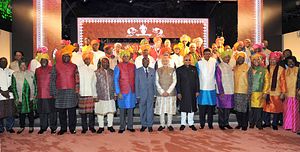Prime Minister Narendra Modi is scheduled to meet with heads of state in four African countries from July 7-11, 2016 in his first visit to the African continent since he took office in 2014. Modi’s official visits will take him to Kenya, Tanzania, Mozambique, and South Africa. Notably, his arrival in Mozambique will mark the first time an Indian prime minister has visited the East African nation in 34 years.
The visit signals not only an extension of India’s influence in the Indian Ocean region, but also a deepening and strengthening of India-Africa partnerships and agreements. The upcoming visit will provide a glimpse into the evolving principles of the Modi doctrine and its role in shaping India-Africa affairs.
Increased diplomatic relations were a focus of the 2015 Third Africa-India Summit, which had the largest representation of African heads of state since the summit began in 2008. The summit culminated in the 2015 Delhi Declaration, which outlines shared values and commitments between India and African states. Modi’s July 2016 tour will revisit agreements made during the summit. High on the agenda will be a proposal for contract farming in Tanzania to buffer India’s shortfall in grain production and maritime security agreements for cooperation on the safeguarding of Indian Ocean trade routes. The visit will also include the signing of agreements aimed at increasing trade and investment in the continent.
Since his election, the premier has embarked on several multi-country official state visits. However, this is his first tour of continental African countries. Modi’s previous visits to African nations included stops in Mauritius and the Seychelles as part of an Indian Ocean tour that successfully repaired relations with Sri Lanka. During the Mauritius portion of the journey, five agreements were signed aligned with economic and security interests, including the India-Mauritius Tax Treaty and a trade agreement on agricultural products. Similar treaties are expected as a result of his 2016 tour with a continued emphasis on Indian Ocean cooperation. There is also speculation that part of the South Africa visit will include a request for support in India’s efforts to join the Nuclear Suppliers Group (NSG).
A common theme has emerged in Modi’s strategy in Africa. Similar to Mauritius and the Seychelles, the four countries included in the 2016 tour are located within the Indian Ocean sphere of influence with significant Indian diasporic populations. As of the 2011 census, for example, the Indian population of South Africa numbered 1.3 million. The tour demonstrates an expansion of Modi’s initial forays into strengthening India-Africa partnerships in and around the Indian Ocean.
Modi’s foreign policy strategy has aimed to increase assistance to developing countries and vie for linkages with the African continent for increased trade, access to agricultural land, and cooperation on maritime security, in part to buffer China’s influence in the region. Both China and India have established roles as increasingly important powers in sub-Saharan African trade and development. While India’s trade with Africa has increased from $25 billion in 2006 to $70 billion; China-Africa trade was valued at an estimated $222 billion in 2014.
In terms of foreign aid, India has traditionally focused on neighboring countries in the Asia-Pacific region (such as Afghanistan, Bhutan, and Nepal) since India emerged as a donor. As India’s establishment as a global donor continues, greater development finance commitments feature prominently in Modi’s Africa strategy particularly in Tanzania, Kenya, and Mozambique. The visit shows a building of momentum of India’s relations with Africa overlapping with Chinese interests.
This year marks the 25th anniversary of the liberalization of India’s economy. As India’s economy has grown, its role as a global power and emerging donor have come to the fore in shaping 21st century geopolitics. Steered by the Modi doctrine, India’s foreign policy has become more assertive in forging new relations with strategic partners while deepening and strengthening bilateral relations with African countries. Prime Minister Narendra Modi’s upcoming visit will seek to formalize agreements to secure increased investment, bilateral trade, and south-south cooperation. The upcoming Africa tour demonstrates an evolving emphasis of India’s foreign policy on south-south cooperation and the maturation of the Modi Doctrine in shaping world affairs.
Michelle DeFreese is an International Research Fellow (Africa Region) with the Young Professionals in Foreign Policy (YPFP). She has previously written articles for the Huffington Post and serves as a consultant for the Institute for Multi-Track Diplomacy.

































